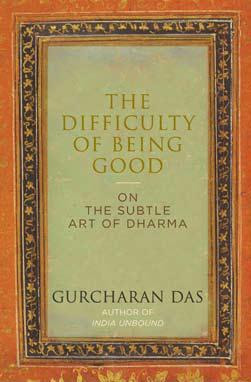Let me confess that I have rejected the idea of purchasing this book after going through first few pages. It was giving me impression that this book was yet another critic on Mahabharata. Though, I had a vague understanding in my mind that it is a work of Gurcharan Das, so there must be something beyond what I was able to perceive. This made me to go to strand book stall in my company several times. The cost of the book (Rs.699) was also giving me not-for-common-man impression. In the mean time, I kept hearing about this book from many colleagues and on a fine morning I decided to purchase this.
Amid speculation of a great philosophy, I started discovering if it has something closer to my heart. In the very first chapter I found following texts.
“Duryodhanaya is not ashamed of his envy because it is part of a larger and consistent egoistic philosophical outlook. When he is feeling low, filled with hatred for the Pandavas, his father tries to comfort him, counseling him not to covet what belongs to Yudhishthira. Duryodhana disagrees. He replies that his duty is to win at all costs. A smart person pursues power and uses it to exact as much as possible from the weak. If he does not do that he leaves himself vulnerable to attack from an enemy”

Duryodhana was portrayed as the hero. I did not have any reason for not believing the author. Though this guy was always presented as the worst villain of the epic, however, the author proves that he was doing what his dharma of Kshatriya was preaching him to do “to win at any cost”. It was an out of box thinking. It motivated me to think further and then I read rest of this book without any pause.
This book is preaching the dharma of corporate life with the examples of mahabharata. It appears to me that no one saw this epic from corporate point of view. In this book the author illustrates the examples from real life business environment and So that reader can get connected very easily. The author also compared the sibling rivalry of Mukesh Ambani and Anil Ambani with Kauravas and Pandavas. The inequality is justified. He suggests to abolish poverty and not the inequality which brings competition among the key stake holders.
There are ten chapters. The first chapter “The duryodhana’s envy” makes a provocative statement, “what a man of mettle will stand to see his rivals prosper and himself decline?”. In the second chapter “Draupadi’s courage is mentioned and key question was asked, “Whom did you lose first, yourself or me?” Yudhishthira has been demonstrated to say, I act because I must”. Arjuna’s despair says that there is no winner in the war in the fourth chapter. Bhisma’s Selflessness emphasizes to concentrate on act and not on fruits, a typical preaching of Geeta in fifth chapter. Karna’s Status Anxiety ends with a tag line “how could a doe give birth to a tiger. Subsequently Ashwatthama’s revenge is mentioned in eighth chapter illustrating “whirligig of time” and finally Yudhisthira announce that victory was indeed a defeat for him.
Author concludes the book with the great example of Ramlinga Raju. He mentioned that Raju had everything success, money and power. Then what made him to commit India’s greatest corporate fraud? He mentioned that it was his blind love for his children. Though he founded Satyam however he had only 8.6% of stake in the company. His blind love for his two sons made him Dhritrashtra of modern corporate India. The conclusion of the book is itself the defining part of “difficulty of being good.”
I recommend reading it. It gives a never before experience.

Hey keep posting such good and meaningful articles.
ReplyDelete